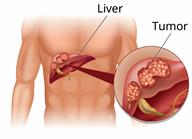Liver Cancer: What to Know

Liver cancer is an abnormal growth of cells (tumor) in the liver. The liver is found on the upper right side of the abdomen, just below the ribs.
What are the causes?
The exact cause of this condition is not known.
What increases the risk?
The following factors may make you more likely to develop this condition:- Having scarring of the liver (cirrhosis). Cirrhosis may be caused by:
- Too much alcohol use.
- Hepatitis B or hepatitis C.
- Smoking.
- Having a buildup of fat in the liver without alcohol use (nonalcoholic fatty liver disease).
- Being male.
- Having diabetes.
- Having obesity.
- Having a condition in which the body stores too much iron (hemochromatosis).
- Being exposed to aflatoxins. These are substances made by certain types of mold that grow on food products, such as corn and peanuts.
- Using medicines that build muscles (anabolic steroids).
- Using birth control pills (oral contraceptives).
What are the signs or symptoms?
In some cases, there are few or no symptoms early on. As the disease grows, spreads, or gets worse (progresses), symptoms may include:- Weight loss.
- Nausea or vomiting.
- Feeling itchy.
- Abnormal bruising or bleeding.
- Skin or the white parts of your eyes turn yellow (jaundice).
- Dark-colored urine.
- White, chalky stools.
- Hypercalcemia. This is high calcium levels in the blood, which may cause weakness, constipation, or confusion.
- Hypoglycemia. This is low blood sugar, which may cause tiredness, confusion, and sweating.
- Gynecomastia. This is enlarged breasts in males.
- Small testicles in males.
- Looking and feeling flushed because of a high number of red blood cells in the body.
- High cholesterol. This is when your blood has high levels of a fatlike substance.
How is this diagnosed?
This condition is diagnosed with a medical history and physical exam. You may also have tests, including:- Blood tests.
- Imaging tests, such as:
- CT scan.
- MRI.
- Ultrasound.
- Bone scan.
- Laparoscopy. A small, lighted camera (laparoscope) is used to look at your liver and other organs.
- Biopsy. Samples of tissue from the liver are taken and tested in a lab.
- The size of the tumor.
- If the cancer has spread.
- Where the cancer has spread.
How is this treated?
Treatment for this condition depends on the type and stage of the cancer, and your overall health. You may need more than one type of treatment. Treatment options may include:- Systemic treatment. This is a type of treatment that works throughout the whole body, such as:
- Chemotherapy. Medicines are used to kill the cancer cells.
- Targeted therapy. This targets specific parts of cancer cells and nearby areas to block the growth and spread of the cancer.
- Immunotherapy, also called biological therapy. This strengthens your body's defense system (immune system) to destroy or stop the growth and spread of cancer cells.
- Localized treatment. This type of treatment is focused on the area where the cancer is.
- Radiation therapy. This uses high-energy X-rays to kill the cancer cells.
- Ablation. This destroys the tumor cells using high-energy radio waves, cold therapy, heat therapy, or a type of alcohol (ethanol).
- Embolization. This is a procedure that blocks the blood flow to the tumor in the liver.
- Chemoembolization. This combines embolization with tiny beads that deliver chemotherapy right to the site of the tumor.
- Radioembolization. This combines embolization with tiny beads that deliver radiation right to the site of the tumor.
- Resection. This is surgery to remove the tumor. Sometimes, the entire liver is removed and replaced with a healthy liver (liver transplant).
- Taking part in clinical trials, if new or experimental treatments are effective.
Follow these instructions at home:
Medicines
-
Take over-the-counter and prescription medicines only as told by your health care provider.
- Ask your health care provider about:
- Changing or stopping your regular medicines. This is especially important if you are taking diabetes medicines or blood thinners.
- Taking medicines such as aspirin and ibuprofen. These medicines can thin your blood. Do not take these medicines unless your health care provider tells you to take them.
- Taking over-the-counter medicines, vitamins, herbs, and supplements.
Lifestyle

-
Do not drink alcohol.
-
Do not use any products that contain nicotine or tobacco. These products include cigarettes, chewing tobacco, and vaping devices, such as e-cigarettes. If you need help quitting, ask your health care provider.
General instructions
-
Consider joining a cancer support group. Ask your health care provider for more information about local and online support groups. This may help you learn to deal with the stress of having liver cancer.
-
Talk to your health care provider about any side effects of treatment and the best way to manage them.
-
Keep all follow-up visits. This is important.
Where to find more information
-
American Cancer Society: cancer.org
-
National Cancer Institute: cancer.gov
-
National Comprehensive Cancer Network: nccn.org
Contact a health care provider if:
-
You cannot eat because you feel nauseous or are vomiting.
-
You feel weaker or more tired than usual.
-
Your pain gets worse.
-
You feel depressed or anxious.
-
Your skin or the white parts of your eyes become more yellow in color.
-
You have a fever, chills, or body aches.
Get help right away if:
-
You feel confused.
-
Pain in your abdomen increases suddenly.
-
Your abdomen or legs start to swell.
-
You notice unusual bleeding or bleeding that does not stop quickly.
-
You have maroon, black, or bloody stools.
-
Do not wait to see if the symptoms will go away.
-
Do not drive yourself to the hospital.
Summary
-
Liver cancer is an abnormal growth of cells (tumor) in the liver that are cancerous.
-
Treatment for liver cancer depends on the type and stage of the cancer, and your overall health.
-
Talk to your health care provider about any side effects of treatment and the best way to manage them.
-
Keep all follow-up visits. This is important.
This information is not intended to replace advice given to you by your health care provider. Make sure you discuss any questions you have with your health care provider.

